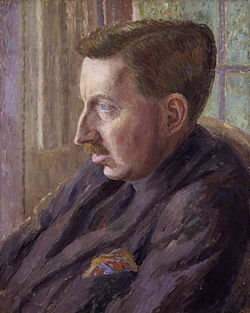E.M. Forster Quote
But the poetry of that kiss, the wonder of it, the magic that there was in life for hours after it--who can describe that? It is so easy for an Englishman to sneer at these chance collisions of human beings. To the insular cynic and the insular moralist they offer an equal opportunity. It is so easy to talk of passing emotion, and how to forget how vivid the emotion was ere it passed. Our impulse to sneer, to forget, is at root a good one. We recognize that emotion is not enough, and that men and women are personalities capable of sustained relations, not mere opportunities for an electrical discharge. Yet we rate the impulse too highly. We do not admit that by collisions of this trivial sort the doors of heaven may be shaken open.
But the poetry of that kiss, the wonder of it, the magic that there was in life for hours after it--who can describe that? It is so easy for an Englishman to sneer at these chance collisions of human beings. To the insular cynic and the insular moralist they offer an equal opportunity. It is so easy to talk of passing emotion, and how to forget how vivid the emotion was ere it passed. Our impulse to sneer, to forget, is at root a good one. We recognize that emotion is not enough, and that men and women are personalities capable of sustained relations, not mere opportunities for an electrical discharge. Yet we rate the impulse too highly. We do not admit that by collisions of this trivial sort the doors of heaven may be shaken open.
Related Quotes
About E.M. Forster
Considered one of the most successful of the Edwardian era English novelists, he was nominated for the Nobel Prize in Literature in 22 separate years. He declined a knighthood in 1949, though he received the Order of Merit upon his 90th birthday. Forster was made a Member of the Order of the Companions of Honour in 1953, and in 1961 he was one of the first five authors named as a Companion of Literature by the Royal Society of Literature.
After attending Tonbridge School, Forster studied history and classics at King's College, Cambridge, where he met fellow future writers such as Lytton Strachey and Leonard Woolf. He then travelled throughout Europe before publishing his first novel, Where Angels Fear to Tread, in 1905. The last of his novels to be published, Maurice, is a tale of homosexual love in early 20th-century England. While completed in 1914, the novel was not published until 1971, the year after his death.
Many of his novels were posthumously adapted for cinema, including Merchant Ivory Productions of A Room with a View (1985), Maurice (1987) and Howards End (1992), critically acclaimed period dramas which featured lavish sets and esteemed British actors, including Helena Bonham Carter, Daniel Day-Lewis, Hugh Grant, Anthony Hopkins and Emma Thompson. Director David Lean filmed another well-received adaptation, A Passage to India, in 1984.
